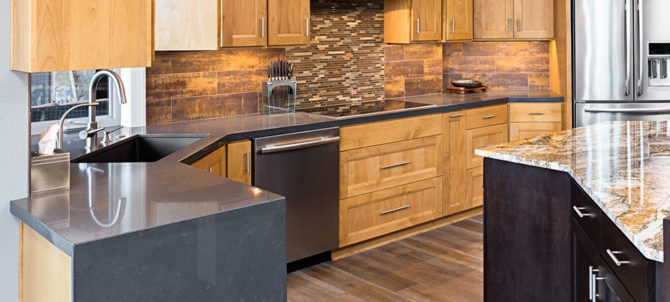
There is no denying granite countertops are one of the best countertop materials in the market. Unfortunately, homeowners worry about radon, so you will hear them asking, does granite emit radon?
What is radon?
If this is the first time hearing the term, radon is a naturally occurring gas commonly found in basements. Radon is radioactive, and when you are exposed to elevated levels of it for a long time, you risk suffering from lung cancer.
How dangerous is radon?
Unlike carbon monoxide (produced by home furnaces, vehicles, and water heaters) that kills fast, radon doesn’t kill immediately—the effects take years to be apparent. As mentioned above, when you are exposed to radon for a long time, you are at more risk of developing lung cancer.
Does granite emit radon?
Several scientific studies show that granite does emit radon, but the levels emitted are usually too low to affect you. When you are researching about granite, you might come across plenty of information warning you about radon levels in granite, but there is scientific evidence that the levels are harmless. If you are in doubt, consider hiring a certified radon inspector to test the countertops.
Will food absorb radon?
There is the worry of food prepared directly on the granite surfaces absorbing radioactive energy. You should note that radioactive elements such as uranium will only get into the food if they get dissolved in water.
Since granite is insoluble, there is no way the radioactive elements will get into water then into food.
You might argue that radioactive energy given off at the granite surface will get into the food that is directly in contact with the surfaces. Still, there is evidence that, like other energetic rays, the radioactive energy changes to heat and/or non-radioactive particles.
Since these processes happen extremely fast, radiation doesn’t get into the food.
Taking care of granite countertops
Instead of worrying your countertops will spread radon, you should take good care of your kitchen countertops, so they last for a long time. How do you do this? Here are expert tips on how to go about it:
Seal the countertops
Granite is porous, so to protect it from stains and spills, you should seal it at the time of installation and at least once every year. To get the most results, use a high-quality sealing product. The sealer should penetrate the granite to seal any groove or spaces in the stone, instead of sitting on the surface.
You can seal the surfaces by yourself, but for best results, let an expert handle it for you.
Properly clean the surfaces.
Like other surfaces, you need to keep granite surfaces clean at all times. When doing the cleaning, be cautious of the cleaning products you are using. While granite is tough, avoid acidic cleaners and sponges that can scratch and wear down the sealant.
When it comes to soap, use a pH neutral soap that won’t cause any harm. Stay away from vinegar or Windex as they can etch the surfaces.
To keep the surfaces free of dirt and grime, wipe them regularly with warm water and a few drops of dish or antibacterial detergent. Once you done, rinse the surfaces thoroughly with clean water and dry them with a soft cloth.
When spills happen, blot them with a paper towel or soft cloth immediately. Don’t wipe spilled liquids such as milk or juice as they can spread around the countertops.
Watch what you place on the countertops.
It’s true granite surfaces are tough, but you should be ultra-cautious of what you place on them. As a rule of thumb, don’t place hot pots or pans on granite as they will damage the surfaces.
While granite can withstand high temperatures, extreme or constant temperature changes can harm the stone. When cooking, granite contractors Durham recommend you always have trivets and coasters on the counters at all time. When you have to place the pans down, place them there.
Granite surfaces are known to be tough, but when you place a lot of weight on them, you risk breaking them. To avoid damaging your stone, never stand on it. You also should never place heavy appliances such as an oven on it.